Appendix is a tube like structure placed at junction of small and large intestine. It resembles a small worm-like structure and is joined by colon. Apparently, appendix does no major function, but can be considered as storehouse for beneficial bacteria. It boosts functioning of digestive system after illnesses like diarrhea. It has been observed that removal of appendix poses no major health issues.
Appendix resembles the shape of pouch and connects to large intestine. Appendicitis and appendix cancer are two major ailments of appendix. Let us understand and study these two ailments elaborately.
What is appendicitis and what are its causes?
Appendicitis is one of the major diseases associated with appendix. The precise cause of appendicitis is yet unknown. Most of the cases of appendicitis develop due to partial or complete obstruction of appendix. 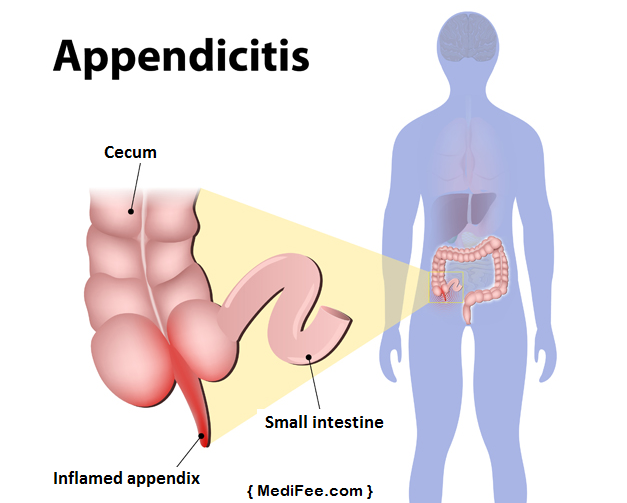
Complete obstruction should be treated on top priority and may require appendix surgery. Obstruction can develop because of worms, tumors, trauma and enlarged lymphoid follicles. Appendix tumors are quite rare. Epithelial tumor growth can be benign or malignant. If obstruction in appendix is not treated early, it will cause buildup of bacteria in the organ. Multiplication of bacteria will gradually lead to formation of pus. Pus will increase pressure on blood vessels and compress local blood vessels. This situation can be quite painful. If appendix does not receive sufficient blood, it may lead to severe condition called as gangrene.
If appendix gets ruptured or if there is any tear in its lining, fecal matter can escape and fill abdomen. This situation calls for medical emergency. Ruptured appendix may as well cause peritonitis which is inflammation of epithelial tissue that lines the wall of abdomen. The condition might as well affect surrounding organs like bladder, cecum and sigmoid
colon.
What are the symptoms of appendicitis?
Appendicitis in initial phase does not exhibit major symptoms apart from mild cramping. As it progresses, symptoms become quite severe until you notice some changes in bowel habits and urination. Few symptoms of appendicitis are mentioned below:
- Experiencing pain around navel
- Loss of appetite
- Abdominal pain in lower right side of the body
- Vomiting
- Nausea
- Constipation
- Diarrhea
- Swelling in abdomen
- Inability to pass gas
- Low grade fever
- A sense that you might feel better after passing stool
If these symptoms occur for even a day, it is better to consult a doctor as soon as possible. Rupture of appendix might happen within 48-72 hours after the symptoms are revealed. Hence, medical consultation is mandatory after facing above symptoms even for a day. These symptoms can appear in combination. If you are experiencing discomfort or tenderness in your right side, you should immediately contact doctor. 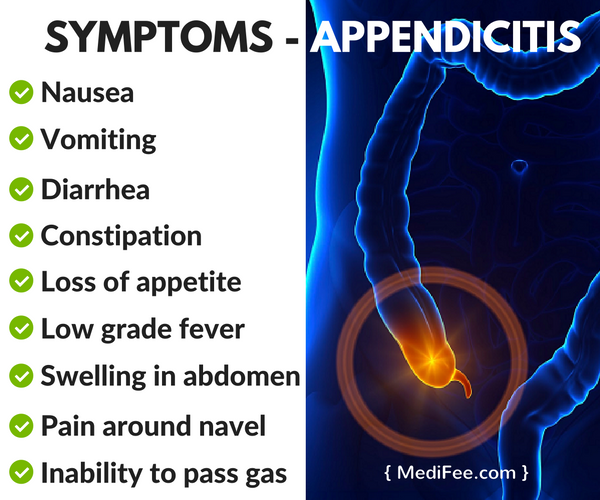 If you suspect, you are suffering from appendicitis, then avoid using laxatives and having enema. These laxatives have counter effect on the treatment and may cause appendix to burst if you are already an appendicitis patient.
If you suspect, you are suffering from appendicitis, then avoid using laxatives and having enema. These laxatives have counter effect on the treatment and may cause appendix to burst if you are already an appendicitis patient.
How is appendicitis diagnosed?
Appendicitis can be physically diagnosed by doctor. If the patient feels tenderness in the lower right part of the abdomen, then there are chances of patient suffering from appendicitis. Perforation can be recognized by signs of hard and swollen stomach. If the patient is pregnant, pain in abdomen can intensify. In addition to physical examination, doctor may perform combination of several diagnostic tests such as urinalysis and X-ray procedures to confirm appendicitis.
- Pelvic tests can be performed on women to rule out chances of pelvic infection and reproductive system disorders
- Kidney stone can also cause pain in lower part of abdomen. Hence, urinalysis test is carried out to rule out chances of kidney stone and urinary tract infection.
- Ectopic pregnancy chances can also be ruled out by performing pregnancy tests
- Abdominal imaging tests such as ultrasound, CT Scan etc. can be used to detect abscess or other abdominal complications that can be reason for abdominal pain
- Right lower lobe pneumonia reveals similar symptoms to that of appendicitis. Hence, chest X-ray is performed to rule out the possibility of cardiac complication.
- Blood test can also be performed to check for infection
What can be possible treatment options for appendicitis?
Depending upon the severity of appendicitis, treatment approach is decided. Doctors usually recommend oral medication and change in diet to prevent infection from developing further before opting for surgical procedures. Liquid diet is generally advised by doctor for few days as it is easy to digest and does not put much pressure on stomach muscles.
In most of the severe cases, appendicitis is usually treated by surgery. Surgery is conducted when infection is well under control. 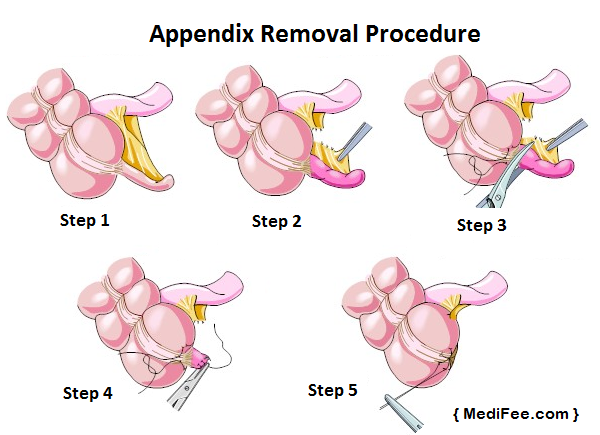 Surgery for appendicitis is called as appendectomy. Appendectomy is performed right away in case of ruptured appendix. Let us check different approaches surgeons implement for performing appendectomy.
Surgery for appendicitis is called as appendectomy. Appendectomy is performed right away in case of ruptured appendix. Let us check different approaches surgeons implement for performing appendectomy.
- Open appendectomy: As the name suggests, in open appendectomy procedure, an incision is made on the lower right side of the abdomen by surgeon. Appendix is removed and the wounded part is closed by stitching. One of the advantages of this procedure is that it allows doctor to clean abdominal cavity if appendix has ruptured or abscess is formed. Open appendectomy is preferred approach to treat abscess and peritonitis.
- Laparoscopic appendectomy: Approach for laparoscopic appendectomy is quite different from that of open appendectomy. In open appendectomy, only one incision is made, whereas in laparoscopic appendectomy, surgeons make several small incisions. An instrument called as laparoscope which is a thin, long tube with attached camera and light at its front side, is inserted into the abdomen through incisions. Camera and light enables surgeon to view internal condition of abdomen and guide the instruments accordingly. When appendix is located, it will be removed and wound will be closed by stitches. Abdomen will be cleansed and closed and incisions made on abdomen will also be closed using stitches. Laparoscopic surgery is less invasive and takes comparatively less time for recovery.
After appendectomy precautions:
Patient has to stay in the hospital for few days until pain is under control and can intake liquid diet. One may require to stay for longer time in hospital if any sort of complication occurs during the surgical process. However, it is rare for any complication to take place and most of the patients heal well sans any complication. Doctor may put patient on
antibiotics for a day or two to prevent infection and boost immune power. Appendectomy does not produce major complications. A person can survive well even if appendix is removed.
How to prevent appendicitis?
There are as such no major steps that help to prevent occurrence of appendicitis. It can develop at any point of time, but generally occurs in the age groups between 10 years and 30 years. The problem is more common in men than in women.
Appendicitis can be avoided if diet is rich in fiber. Fiber forms important part of diet. It is referred as roughage in scientific terms and it is the only part of diet that does not provide any nutrients.  Rather, roughage is not digested by the body, but still is very important, because it helps in bowel formation and smooth movement of bowels. Examples of foods rich in roughage or fiber are fruits like raspberries, apples, pears, melons, banana etc. and vegetables like broccoli, artichokes, black beans, green peas, barley, oatmeal, bran flakes, lentils, whole wheat preparations etc. are also good sources of fiber.
Rather, roughage is not digested by the body, but still is very important, because it helps in bowel formation and smooth movement of bowels. Examples of foods rich in roughage or fiber are fruits like raspberries, apples, pears, melons, banana etc. and vegetables like broccoli, artichokes, black beans, green peas, barley, oatmeal, bran flakes, lentils, whole wheat preparations etc. are also good sources of fiber.
What is appendix cancer?
Appendix is a part of gastrointestinal tract. Though it does not have any significant function to perform, it acts like a storehouse of good bacteria which help in digestion process. Cancer is one of the most dreaded disease wherein cells multiply abnormally and destroy healthy muscles. The cells form tumors that can be benign or malignant. Malignant tumors spread to other parts of body if not treated early.
Different types of tumors that can grow in appendix are- Carcinoid tumor, Appendiceal mucoceles, Colonic-type adenocarcinoma, Signet-ring cell adenocarcinoma, Goblet cell carcinomas or Adenocarcinoids and Paraganglioma tumors. Let us study these
types of tumors in detail.
- Carcinoid tumor: Most of the patients with appendix cancer are diagnosed by carcinoid tumor. The tumor generally occurs at the tip of appendix. Carcinoid tumor generally starts in cells which produce hormones and are present inside every body organ in very small proportion. It may as well start in gastrointestinal tract or lungs but, might occur in organs like pancreas, women’s ovaries or men’s testicles too. Carcinoid tumor that remains confined in appendix can be successfully treated by surgery, but carcinoid tumor that spreads to other parts becomes quite complicated to treat. The symptoms don’t show up early and hence, it is diagnosed when the cancer has advanced to later stages.
- Appendiceal mucoceles: Swelling of appendix wall creates mucoceles (sac like structures) which are filled with mucus. They can be benign or malignant tumors. Conditions that can form mucoceles are Mucinous cystadenomas which are benign (do not spread to other parts) and Mucinous cystadenocarcinomas that can be malignant.
- Colonic-type adenocarcinoma: Colonic-type adenocarcinoma usually occurs at the base of the appendix and counts for approximately 10% cases of appendix cancer.
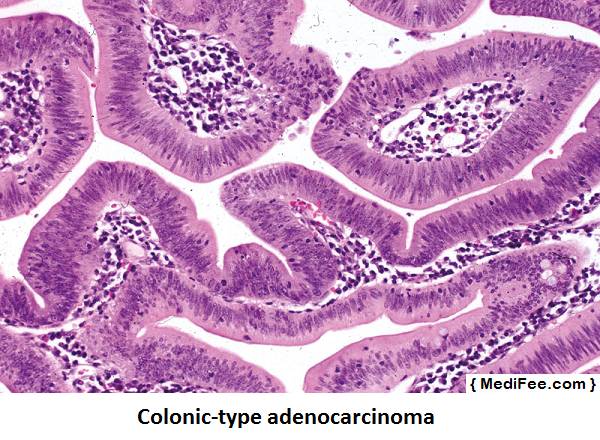 This type of cancer gets diagnosed mostly in later stages and is complex to treat.
This type of cancer gets diagnosed mostly in later stages and is complex to treat. - Signet-ring cell adenocarcinoma: Signet-ring cell adenocarcinoma is a very rate type of tumor and usually occurs in colon or stomach. It causes appendicitis when it spreads to appendix. It is one of the most aggressive type of tumor and quite difficult to treat.
- Goblet cell carcinomas or Adenocarcinoids: Goblet cell carcinomas or Adenocarcinoids show similar characteristics to that of carcinoid tumor and adenocarcinoma tumor. The tumor is considered to be more aggressive than carcinoid tumor, but the treatment adapted to treat this type of tumor is similar to that used to treat adenocarcinoma tumor.
- Paraganglioma tumor: Its a very very rare type of tumor and is generally considered as benign. Thus, it can easily be treated with help of surgery.
What are the symptoms of appendix tumor?
Patient may not necessarily show all the symptoms of appendix cancer mentioned below. Few of the symptoms can be revealed and sometimes, the symptoms can be causes of other disease apart form appendix cancer. If these symptoms continue for over a week or so, better consult with doctor. Signs and indications of appendix cancer are:
- Appendicitis
- Bloating
- Ascites (fluid in abdomen)
- Changes in bowel function
- Pain in pelvic area
- Infertility
- Increase in size of waistline
How is appendix cancer diagnosed?
Appendix cancer can be diagnosed with the help of physical examination along with several diagnostic tests like biopsy, CT Scan, MRI Scan and ultrasound.
- During physical examination, doctor will evaluate patient’s physical signs and symptoms
- Biopsy involves removal of small amount of tissue for purpose of examination under microscope. It is one of the most accurate cancer diagnostic tests.
- CT Scan (Computed Tomography) is an image screening procedure wherein 3 dimensional internal organ pictures are obtained using X-rays taken from various angles. The scan also evaluates size of the tumor.
- MRI Scan (Magnetic Resonance Imaging) makes use of strong magnetic fields and radio waves to obtain high quality internal structure images. Unlike CT Scan, MRI scan does not make use of X-ray procedure.
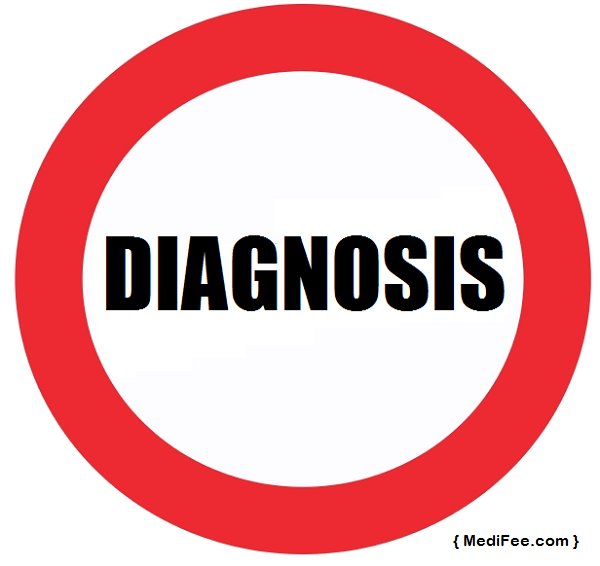
- Ultrasound procedure makes use of sound waves to create internal body images
Oncologist (cancer specialist) may ask the patient to undergo few of the above mentioned diagnostic tests to get precise outcome.
Treatments for appendix cancer:
Long gone is the era when cancer was one of the leading cause of death because of no available treatment. Thanks to advancement in medical science, cancer now has cure under certain conditions. Depending upon metastasis of cancer, treatment option is selected. Let us explore some cancer treatment options available:
- Surgery: Surgery involves removal of cancerous tumor and surrounding tissues that have been affected.
- Appendectomy: Appendectomy is a surgical procedure that is employed to remove appendix. It is one of the treatments available to treat carcinoid tumors that are less than 1.5 cm in size.
- Debulking surgery: This surgery is performed when the cancer has advanced to later stages. In this procedure, surgeon removes most of the tumor bulk. Though this procedure does not eliminate each and every cancer cell in the body, it is still beneficial to the patient. This surgery is usually followed by chemotherapy procedure.
- Chemotherapy: Principle by which chemotherapy works is that it makes use of drugs to stop growth of cancerous cells and kill their ability to multiply. The procedure is performed by expert oncologists and has to repeated in certain sets. Chemotherapy does have some side-effects like hair loss, fatigue, nausea, vomiting etc.
- Radiation therapy: Radiation therapy makes use of high energy X-rays to kill cancerous cells. Radiation therapy like chemotherapy has to be repeated for number of times and does have side-effects like fatigue, upset stomach, skin reactions, loose bowel movements etc.
All the cancer treatments are followed by regular doctor follow-ups to assess how well patient’s body has responded to treatment and check for recurrence of cancer.
In this article, we have understood about appendix and its related problems like appendicitis and appendix cancer. Both the diseases can be fatal if not diagnosed and not treated in early stages.
Appendix though is a small organ of a body and does not perform any major function, it is important that we consult doctor as early as possible in case of any appendix related problems. Removal of appendix does not possess any major threat to body functioning and person can carry out daily activities without any complication.
hello
Iam mohammad hassan from iran
can I use from your pic ?
tanks
Yes, you may, it would be great if you’d provide a linkback to us.